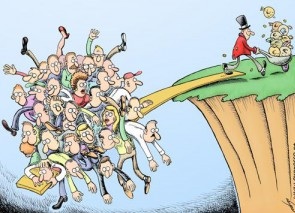Rising income inequality has cost European economies up to 10 percent in lost economic output over the past twenty years, according to a new report by the bloc’s leading economic thinktank.
The richest 10 percent across the OECD’s 34 member countries earn 9.5 times as much as the poorest 10 percent.
The report, published by the OECD, refutes the concept of ‘trickle-down economics’ which the political establishment in most western countries have signed up to for the past generation.
While a raft of recently published research has demonstrated that countries with high levels of income inequality suffer from higher levels of crime and health and social costs, there has hitherto been little evidence that it acts as an active drag on economic performance.
The richest 10 percent across the OECD’s 34 member countries, most of whom are EU members, now earn 9.5 times as much as the poorest 10 percent, up from a 7:1 ratio in the 1980s.
However, France, Ireland and Spain bucked the trend, where lower gaps between rich and poor actually gave a marginal boost to economic growth prior to the economic crisis, while inequality has had a more detrimental effect in the UK and Finland – where it shaved off nine percent from growth – than in Italy and Sweden which lost an estimated six percent of output between 1990 and 2010 because of rising inequality.
“Income inequality has a sizeable and statistically significant negative impact on growth,” the report says, adding that “redistributive policies achieving greater equality in disposable income has no adverse growth consequences.”
The research indicates that income inequality gradually lowers the educational achievement of students with poor parents, lowering social mobility in the process.
“Addressing high and growing inequality is critical to promote strong and sustained growth,” said Angel Gurria, the OECD’s Secretary General, at the the launch of the report.
“Countries that promote equal opportunity for all from an early age are those that will grow and prosper,” he added.
In response, the OECD urges governments to hike property taxes on property and wealth and scrap tax breaks that disproportionately benefit higher earners, alongside greater support for the bottom 40 percent of earners to make sure that they are not left further behind.
“As top earners now have a greater capacity to pay taxes than ever before, governments may consider re jigging their tax systems,” argues the report, adding that governments should also increase access to education, healthcare and training.
“Anti poverty programmes will not be enough,” it states.

